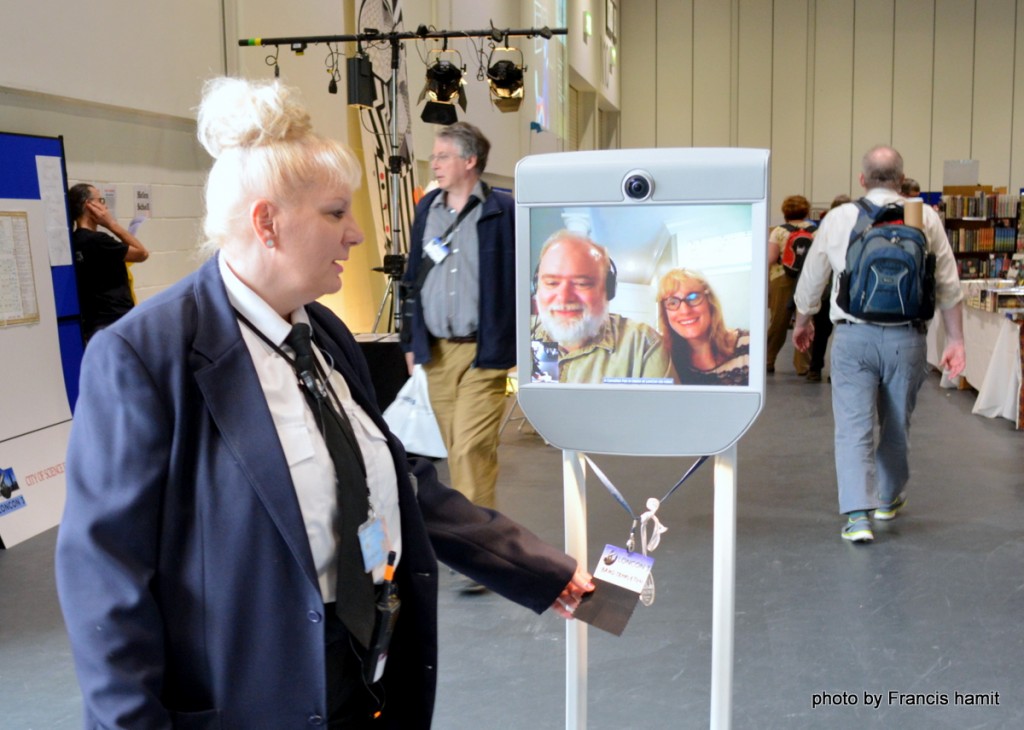By Francis Hamit: Loncon 3 ran so well that it begs a record of small things that worked and should be added to the list of “best practices”. I speak as one who has attended 111 conventions, including 10 WorldCons and NASFICs. Full disclosure: I have never been involved in “con-running” and am not a SMOF.
First of all, security here was left to the professionals who work at ExCel. The UK has a very strong security consciousness and culture. There are CCTV cameras everywhere in London, and security officers in black suits and ties are ubiquitous. Rather than oppressive, their presence is reassuring in a city with a recent tragic history of terrorist attacks. In the USA, this function detailed to fan volunteers, whose quality ranges from poor and indifferent to jack-booted thugs. I spent twenty-one years in the security industry, and have an appreciation for the fine details of the art.
An innovation here was the provision of “Listeners”. These were people that attendees could go to with their concerns and complaints, or if they just needed someone to talk to. It was emphasized that first-time attendees should be especially aware of this service. I don’t know how much this was actually used, but I suspect that many molehills were prevented from becoming mountains because this service was there.
The Press Room was run by professionals for professionals, and, as a result, was able to not only handle Mundane reporters from mainstream media, but turn their presence to advantage and avoid the usual “look at all the funny people” journalism.
The Fan Village, and the prohibition of parties in hotel rooms, were also a unique feature that should be emulated. No elevators, er, lifts, were broken at this convention, and everyone got enough sleep (maybe).
The long lines at every turn were a detriment, because they soaked up time that could have been spent enjoying the convention. This was probably unavoidable and unplanned because of the last-minute surge in registrations, and the size of the convention, which was record-breaking. Perhaps additional volunteers could have been requested from the lines, of people who had experience with cons in other places, to help out an hour or so to speed things along.
Part of the programming was provided in German, because of the number of German fans attending. This made it a truly “World” con. Whether or not it could be emulated in the USA is an open question.
The huge expanses of concrete and distances between events and functions seem inevitable, but given the “graying of fandom” factor, more attention needs to be paid to disabled access. There were a number of incidents where people on mobis ran into each other and were injured.
Finally, as I sat in the concourse one day, that fandom in general needs to go on a diet and find a good chiropractor. We are woefully out of shape, and I am no exception.
Respectfully submitted.
Discover more from File 770
Subscribe to get the latest posts to your email.


Re non-English language programming: I believe that LoneStarCon 3 had some programming in Spanish. (Not surprisingly, Anticipation in Montreal had some in French.)
And one of my vivid recollections from ConFiction in The Hague was watching a film I really wanted to see. Unluckily, it was in French. Luckily, it was subtitled. Unluckily, it was subtitled in Dutch. Luckily, it had very little dialogue. (And between my Spanish and my friend’s German, we could almost figure out some of the lines.)
Interesting points. I don’t think you’re going to get much support for a ban on room parties. Those are a sacred tradition of American fandom.
Sorry, but at least a significant portion of the Thursday registration line length has to be put on Loncon. I arrived about noon on Thursday, having walked from the far side of the ExCel thinking “Huh. As big as Comic-Con’s San Diego Convention Center but without the line”…until I saw how ridiculously long the reg line was.
Figuring I could either stand in line for an hour or two or help out and grab my own badge while doing so, I went down and offered my services. There were at least two problems that have been solved long ago;
1) Pre-reg had a single line, such that each registration laptop/station was responsible for registering any member. Since all badges couldn’t be next to every station, when someone checked in, the registrar would have to send a runner to dig the appropriate badge out of the multi-thousand alphabetized batch…possibly having to wait until another runner finished looking through the same box they needed to get to. There are at least two solutions to this; a) have multiple lines each serving an about equal number of preregged as divided by alphabet. So station one is, say, A-Bo, station 2 is Bo-D, etc. with fen lining up at the appropriate station, which has its relevant badges right next to it. b) a non-networked checkin setup (the databases are recombined later) with *fast* printers that print the badge on the spot.
2) If there was a separate problems desk, it wasn’t obvious and I wasn’t told about it when I started at a station. If someone’s taking up a lot of time due to a problem and blocking a station from others, you should send them to the problems desk that deals with problems, special circumstances, and can make decisions.
What caused the lines on Thursday, afaik was a combination of more people showing up at roughly the same than expected and sheer bad luck: the network went down.
Once it was back up and more laptops had been wrangled, people were plucked from other areas of the con and sent to help out, like myself.
There were actually problem desks to sent people to as well as for special cases like programme participants.